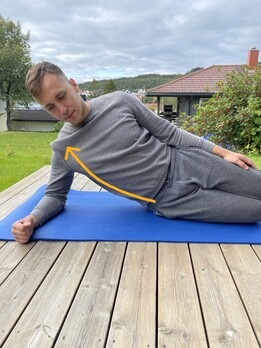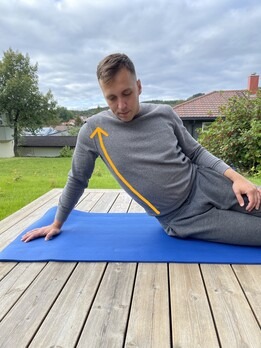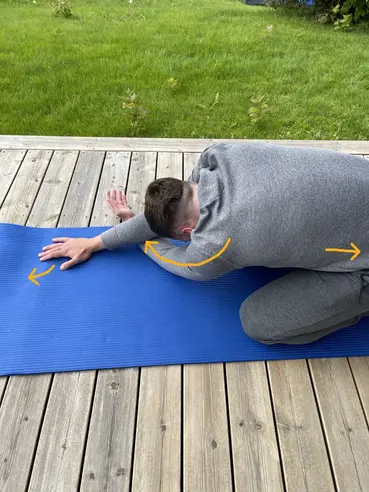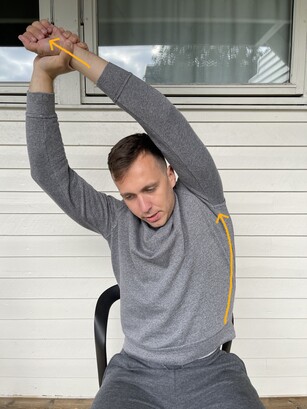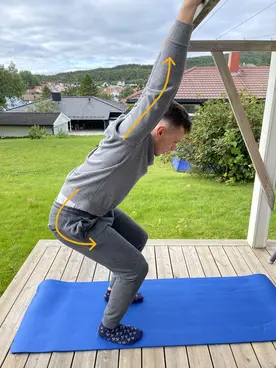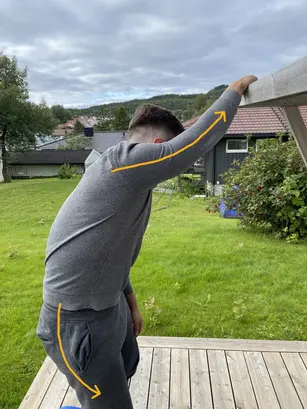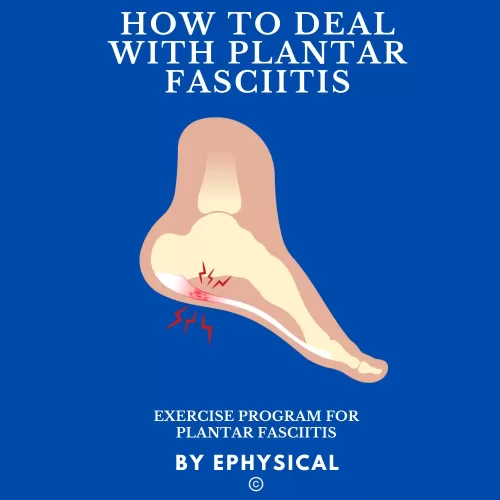Best Serratus Anterior Stretching Exercises for Flexibility and Pain Relief
This article will show you how to perform serratus anterior stretches from various staring positions.
Tightness in the serratus anterior muscle if often closely connected with forward head posture and/or winged scapula.
Let me show you a few serratus anterior stretches that are actually part of a physical therapy treatment.
How to Stretch Serratus Anterior Muscle
Release Serratus Anterior Muscle
Before stretching serratus anterior, perform this serratus anterior trigger point release.
- Lie down on your side.
- Place a foam roller or massage ball beneath your serratus anterior muscles (ribcage area).
- Extend your arm of the stretched side.
- Gently place a weight on a yoga ball/foam roller.
- Hold for about two minutes.
Now you can proceed with stretches for serratus anterior.
Best Serratus Anterior Stretches
Basic Side-Lying Serratus Anterior Stretch
Lie on one side and support your body with your forearm against the ground. Push your body upwards, not moving your hips and hold this position for 30 seconds.
Advanced Side-Lying Serratus Anterior Stretch
Lie on one side and place your palm on the floor. Push your body upwards while keeping your body stable. Hold for 30s.
‘Sit on Heel’ Serratus Anterior Stretch
Sit on your heels, extend and cross your arms to one side, pushing one crossed arm forward while using the other arm to resist backward. Rotate your hips backward (posterior pelvic tilt). Hold this position for 30 seconds.
Seated Serratus Anterior Stretch
While sitting on a chair with your arms raised, bend the upper part of your body to one side. Then perform traction with the opposite arm from the side you’re bending your upper body towards. Hold that position for 30 seconds.
Standing Serratus Anterior Stretch
From a standing position place your hands on a bar or something similar. Then lower your body and rotate your pelvis backward. Hold this stretch for 30s.
Standing Serratus Anterior Stretch with Rotation
From a standing position place one hand on a wall or a bar. Rotate your upper body to one side slightly. Lower the opposite hip as much as you can. Hold that position for 30s.
How to Tell if You Have a Tight/Painful Serratus Anterior?
Not having a normal range of motion in the arm and shoulder and experiencing difficulties when performing overhead activities and reaching with your arm forward is a sign of a tight and/or painful serratus anterior.
What Causes Tight/Painful Serratus Anterior?
Upper-crossed syndrome, injury of a long thoracic nerve (which causes scapular winging), constant stress and tension caused by repetitive motion are most common causes of pain and tightness of serratus anterior muscle.
Further injuring the serratus anterior has a negative effect on rotator cuff muscles, making the shoulder joint prone to subacromial impingement syndrome.
Why is Serratus Anterior Important for Shoulder and Shoulder Blade (Scapula)?
Serratus anterior muscle function is scapular protraction and upward rotation of the scapula. This muscle is a key stabilizer of a scapula. When you perform an overhead press or shoulder press, you protract your shoulder (move forward).
You wouldn’t be able to perform those movements without a functional serratus anterior muscle.
Tips When Stretching Serratus Anterior
- Don’t bounce into a serratus anterior stretch
- Position your shoulder blade before stretching
- Breathe deeply – This is super important because serratus anterior is active when breathing
- If you experience pain when stretching this muscle, consult with your healthcare provider
Conclusion
Serratus Anterior stretches are effective for improving the function of the shoulder blade and shoulder joint. Having a flexible and functional serratus anterior is key to preventing shoulder pain and subacromial impingement syndrome.
Choose the most suitable serratus anterior stretches from the list and perform them once per day. Good stretching.

